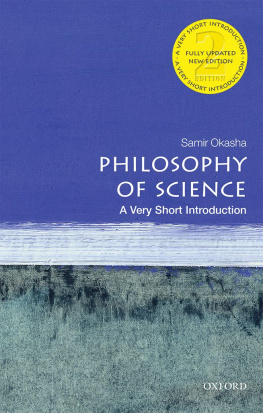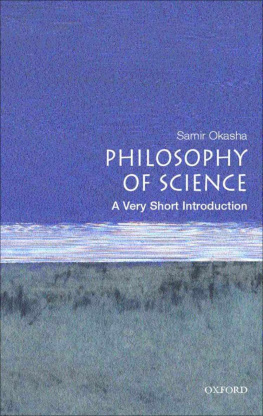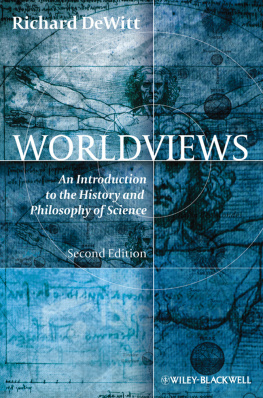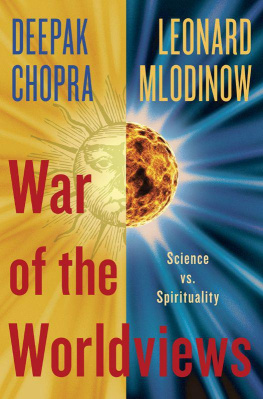DeWitt - Worldviews: an introduction to the history and philosophy of science
Here you can read online DeWitt - Worldviews: an introduction to the history and philosophy of science full text of the book (entire story) in english for free. Download pdf and epub, get meaning, cover and reviews about this ebook. City: Chichester, year: 2018, publisher: John Wiley & Sons, Inc.;Wiley Blackwell, genre: Religion. Description of the work, (preface) as well as reviews are available. Best literature library LitArk.com created for fans of good reading and offers a wide selection of genres:
Romance novel
Science fiction
Adventure
Detective
Science
History
Home and family
Prose
Art
Politics
Computer
Non-fiction
Religion
Business
Children
Humor
Choose a favorite category and find really read worthwhile books. Enjoy immersion in the world of imagination, feel the emotions of the characters or learn something new for yourself, make an fascinating discovery.

Worldviews: an introduction to the history and philosophy of science: summary, description and annotation
We offer to read an annotation, description, summary or preface (depends on what the author of the book "Worldviews: an introduction to the history and philosophy of science" wrote himself). If you haven't found the necessary information about the book — write in the comments, we will try to find it.
DeWitt: author's other books
Who wrote Worldviews: an introduction to the history and philosophy of science? Find out the surname, the name of the author of the book and a list of all author's works by series.
Worldviews: an introduction to the history and philosophy of science — read online for free the complete book (whole text) full work
Below is the text of the book, divided by pages. System saving the place of the last page read, allows you to conveniently read the book "Worldviews: an introduction to the history and philosophy of science" online for free, without having to search again every time where you left off. Put a bookmark, and you can go to the page where you finished reading at any time.
Font size:
Interval:
Bookmark:
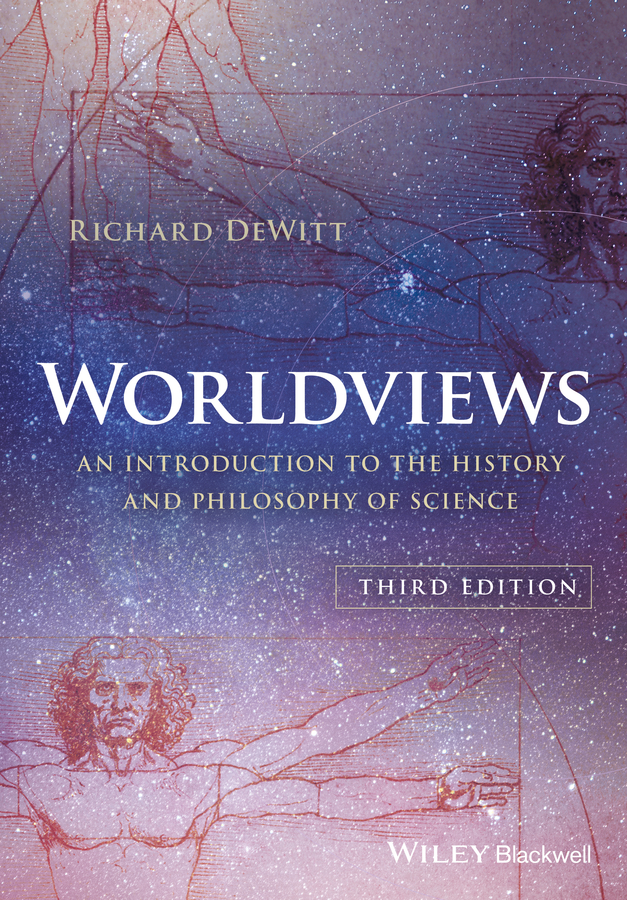
This edition first published 2018
2018 Richard DeWitt
Edition History: 1e: Blackwell Publishing Ltd, (1e, 2003); John Wiley & Sons Ltd, (2e, 2010)
All rights reserved. No part of this publication may be reproduced, stored in a retrieval system, or transmitted, in any form or by any means, electronic, mechanical, photocopying, recording or otherwise, except as permitted by law. Advice on how to obtain permission to reuse material from this title is available at http://www.wiley.com/go/permissions.
The right of Richard DeWitt to be identified as the author of this work has been asserted in accordance with law.
Registered Offices
John Wiley & Sons, Inc., 111 River Street, Hoboken, NJ 07030, USA
John Wiley & Sons Ltd, The Atrium, Southern Gate, Chichester, West Sussex, PO19 8SQ, UK
Editorial Office
9600 Garsington Road, Oxford, OX4 2DQ, UK
For details of our global editorial offices, customer services, and more information about Wiley products visit us at www.wiley.com.
Wiley also publishes its books in a variety of electronic formats and by print-on-demand. Some content that appears in standard print versions of this book may not be available in other formats.
Limit of Liability/Disclaimer of Warranty
While the publisher and authors have used their best efforts in preparing this work, they make no representations or warranties with respect to the accuracy or completeness of the contents of this work and specifically disclaim all warranties, including without limitation any implied warranties of merchantability or fitness for a particular purpose. No warranty may be created or extended by sales representatives, written sales materials or promotional statements for this work. The fact that an organization, website, or product is referred to in this work as a citation and/or potential source of further information does not mean that the publisher and authors endorse the information or services the organization, website, or product may provide or recommendations it may make. This work is sold with the understanding that the publisher is not engaged in rendering professional services. The advice and strategies contained herein may not be suitable for your situation. You should consult with a specialist where appropriate. Further, readers should be aware that websites listed in this work may have changed or disappeared between when this work was written and when it is read. Neither the publisher nor authors shall be liable for any loss of profit or any other commercial damages, including but not limited to special, incidental, consequential, or other damages.
Library of Congress Cataloging-in-Publication Data is available for this title
Names: DeWitt, Richard, author.
Title: Worldviews : an introduction to the history and philosophy of science / Richard DeWitt.
Other titles: World views
Description: Third edition. | Hoboken : Wiley, 2018. | Includes bibliographical references and index. |
Identifiers: LCCN 2017049915 (print) | LCCN 2017059375 (ebook) | ISBN 9781119118985 (pdf) | ISBN 9781119118992 (epub) | ISBN 9781119118893 (pbk.)
Subjects: LCSH: ScienceHistory. | SciencePhilosophy.
Classification: LCC Q125 (ebook) | LCC Q125 .D38 2018 (print) | DDC 509dc23 LC record available at https://lccn.loc.gov/2017049915
Cover images: (Vitruvian Man by Leonardo da Vinci) Vaara / iStockphoto; (Night Sky) Misha Kaminsky / iStockphoto
Cover design by Wiley
For Susie
- A grocery list of Aristotle's beliefs
- Aristotle's jigsaw puzzle of beliefs
- A peek into Sara's consciousness
- Sara's conscious experience
- The Total Recall scenario
- Illustration of Euclidean axiom
- Mars' motion on the Ptolemaic system
- Does the ball follow this path?
- Or does the ball follow this path?
- Treatment of Mars on the Ptolemaic system
- The flexibility of epicycledeferent systems
- Position of Mars against the backdrop of the fixed stars
- Explanation of retrograde motion on the Ptolemaic system
- Minor and major epicycles
- The treatment of Mars on the Copernican system
- Explanation of retrograde motion on the Copernican system
- The Tychonic system
- An ellipse
- Orbit of Mars on Kepler's system
- Illustration of Kepler's second law
- Nested sphere, cube, and sphere
- Kepler's construction
- Kepler's construction with the solids removed
- Photograph of sun and planets
- Sun-centered interpretation of photograph
- Earth-centered interpretation of photograph
- Phases of Venus
- Phases of the moon
- Sun, Venus, and Earth on the Ptolemaic system
- Sun, Venus, and Earth on a sun-centered system
- Boat and swimmer analogy
- The swimmers return at different times
- Illustration for special relativity
- Snapshot A
- Snapshot B
- A typical Cartesian coordinate system
- Magnetic field lines
- Typical field lines in general relativity
- Electrons as particles
- Electrons as waves
- The particle effect and the wave effect
- Two slit experiment with electron detectors
- Beam splitter experiment
- Families of wave mathematics
- Representation of a wave equation
- Adding family members to produce a particular wave
- Members of another family can produce the same wave
- Representation of the wave function for an electron in a particular setting
- Families associated with measurements
- Wave function for electron
- Family P associated with measurements of position
- Wave function decomposed into members of family P
- Beam splitter arrangement
- Schrdinger's cat
- A typical EPR setup
- Coke machine analogy
- Modified EPR scenario
- Results of genetic drift simulation
- Prisoner's dilemma payoff matrix
- Ultimatum game payoff matrix
- Trust game payoff matrix
Countless people made contributions to the various editions of this work. Some contributions were large, some small, but all of them were important. For the various editions I have received invaluable feedback from numerous anonymous reviewers, sometimes catching outright mistakes and sometimes providing good suggestions for clarifying discussions. Although I do not know who these reviewers are, I would like to thank them for their important contributions. From the time this book project began, when the manuscript existed only as a rough draft, and continuing through drafts of the current edition, my philosophy of science students have provided excellent feedback on which ideas worked and which did not, which explanations were clear and which not so clear, and more. There are too many of them to name, but I would like to thank them as a whole for their help. I likewise cannot begin to name, but I do appreciate, all of the colleagues who over the years have discussed these issues with me, read portions of manuscripts, and helped me clarify and oftentimes correct my thinking on various issues. I would like to note that in spring 2016 I had the honor of leading a small group of exceptional students in a seminar in cognitive science and the philosophy of mind. Together we thought through a variety of issues in current science, history of science, and philosophy of science, and this group forced me to expand upon, clarify, and sometimes rethink a variety of views related to the history and philosophy of science. For this I'd like to acknowledge the contributions of Dan Boley, Chris Cardillo, Alex Clinton, Chris Fazekas, Aidan Grealish, Tom Greenwood, Tess McMahon, Elliot Neski, Justin Paton, Kali Schlegel, Andrew Schmidt, and John Simon. I would like again to note the contributions of Charles Ess of the University of Oslo, and Marc Lange of the University of North Carolina-Chapel Hill, both of whom read drafts of the entire first edition, most of which is included in both the second edition and this edition. Each provided lengthy, detailed, and helpful comments and suggestions (not to mention saving me from several embarrassing mistakes). In addition, I'd like to thank Todd Disotell and Shara Bailey of the Center for the Study of Human Origins, New York University, for an invigorating 2009 seminar on evolution, and the Faculty Resource Network for their financial support for that seminar. Regarding the material on evolution, I would like to acknowledge Richard Gawne, whose observations were largely responsible for me rethinking the way that material was presented in the previous edition. I wish also to recognize Helen Lang, who unfortunately passed away not long ago. Conversations with her were exceptionally valuable in helping me clarify certain aspects of Aristotle's physics and general philosophy of nature. Thanks also to Giles Flitney for his excellent work as copy-editor for this latest edition. Finally, I would again like to thank my original editor on this project, Jeff Dean, whose feedback was invaluable in the original organization and presentation of this manuscript.
Next pageFont size:
Interval:
Bookmark:
Similar books «Worldviews: an introduction to the history and philosophy of science»
Look at similar books to Worldviews: an introduction to the history and philosophy of science. We have selected literature similar in name and meaning in the hope of providing readers with more options to find new, interesting, not yet read works.
Discussion, reviews of the book Worldviews: an introduction to the history and philosophy of science and just readers' own opinions. Leave your comments, write what you think about the work, its meaning or the main characters. Specify what exactly you liked and what you didn't like, and why you think so.




